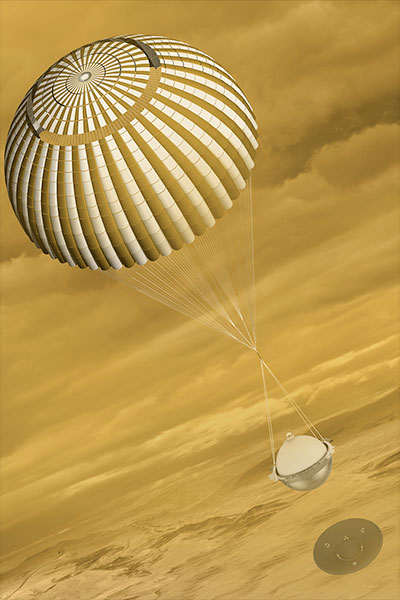Lockheed Martin to Help NASA Uncover Mysteries of Venus with DAVINCI+ SpacecraftTo learn more about how terrestrial planets evolve over time, NASA selected the DAVINCI+ mission for its Discovery Program, bound for Venus. Lockheed Martin will design, build and operate the spacecraft. The mission will launch in 2030 and will study Venus' dense atmosphere, topography and geologic processes in great depth.
The mission aims to discover how Venus – which may have been the first potentially habitable planet in our solar system – became inhospitable to life.
The operations and science for DAVINCI+ – which stands for Deep Atmosphere Venus Investigation of Noble Gases, Chemistry and Imaging Plus – will be managed by NASA's Goddard Space Flight Center in Greenbelt, Maryland.
Why Does Venus Matter?
Though scientists believe it was once similar to our home planet, Venus evolved to be much different – and far less habitable – than Earth.
As Earth's own climate and geology evolve, interest in returning to Venus has surged because the planet currently suffers from a runaway greenhouse gas effect.
Over millennia, water that may have once existed on Venus' surface evaporated and carbon dioxide built up in the atmosphere – leading to a present-day surface temperature that's hot enough to melt lead.
Previous missions to Venus have even provided tantalizing clues that the planet may have once harbored a liquid ocean.
DAVINCI+ will build on those findings, helping scientists better understand the existence of past life on Venus and how its atmosphere and geology may have influenced its ultimate outcome.
Science from this mission could provide clues about Earth's own future and will also help inform future missions to the planet.
Measuring Venus' Atmosphere with DAVINCI+
Part orbiter and part probe, the DAVINCI+ spacecraft will provide a look into Venus' atmosphere in unprecedented detail.
When it arrives at Venus, the DAVINCI+ spacecraft will jettison a probe to the planet's surface. As it descends, three instruments will take the first-ever live measurements from inside Venus's atmosphere – assessing gases, material composition, temperature and pressure.
A camera on board will also snap the most detailed images ever taken of Venus' hidden surface, which is obscured by thick, noxious clouds.
Legacy of Planetary Exploration
DAVINCI+ is the ninth NASA Discovery Program mission Lockheed Martin has been part of.
NASA's Discovery Program-class missions are capped at a specific, relatively low cost. They are managed for NASA's Planetary Science Division by the Planetary Missions Program Office at Marshall Space Flight Center in Huntsville, Alabama. The missions are also designed and led by a principal investigator, who assembles a team of scientists and engineers to address key science questions about the solar system.
Over 50 years, Lockheed Martin has helped NASA explore every planet of our solar system, and continues to develop new technologies for future space missions.
The company also supported NASA on Magellan, the agency's prior mission to Venus 30 years ago. Lockheed Martin built that spacecraft, which produced the first ever maps of Venus' surface from orbit.
Now, the team builds on that legacy of discovery with DAVINCI+.












